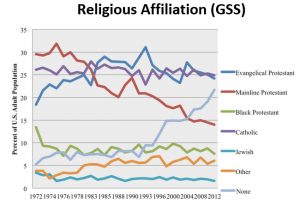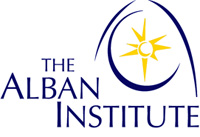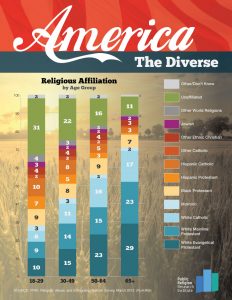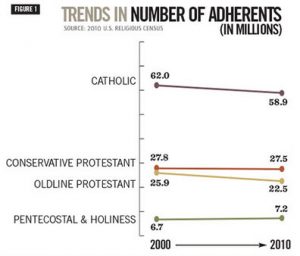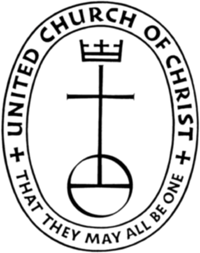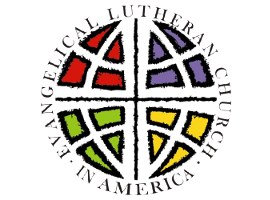Tom Ehrich, a writer and Episcopal priest, recently slammed the work of an Episcopal task force. For him, the task force's focus on what can be done at the level of the denomination "seems a bit like redecorating and recalibrating the home office of a company in which the home office plays a minor role." The time for that type of change ended decades ago. The mainline denominations (a group that includes Episcopalians) are a shell of what they once were, and are now "down more than Read More …
mainline
Shifts in Religious Affiliation (1972-2012) (#1464)
The changing role of religion in American culture is a popular topic of conversation among religious leaders. Those leaders situated within Mainline Protestantism (a tradition I claim as my own) are talking more openly than ever before about decline. Even the names used to describe the tradition increasingly recognize that the decline is both about diminishing numbers of adherents (Oldline) and a more marginalized role (Sideline). While I am encouraged by increased attention Read More …
End of an Era (#1383)
Travis Scholl, managing editor of theological publications at Concordia Seminary - St. Louis, recently reflected on what some view as signs that we are at or nearing the end of an era. More specifically, he mentioned two recent news stories: (1) Alban Institute's decision to shut its doors and (2) the Unitarian Universalist Association's decision to sell its historic headquarters atop Beacon Hill in Boston. Scholl places these changes in their appropriate historical Read More …
America the Religiously Diverse (#1328)
Last week's graphic of the week from the Public Religion Research Institute is titled America the Diverse. In the days since it was posted, I have returned to it several times and referenced it in multiple conversations. So What? The information contained on this graphic isn't news to those who follow generational trends. It is, however, important data for congregational leaders to consider as they plan for the future. Currently, I serve two mainline congregations comprised Read More …
Leaving Your Denomination (#1312)
Recently, the United Methodist Church has been in the media spotlight over the departure of clergy. Most such publicity has focused on those who have chosen to perform same-sex weddings despite the denominations official position prohibiting such. While such acts are likely to continue to attract attention and may ultimately help lead to reform, the denomination's position on who clergy may marry is not the only reason clergy are leaving the denomination. Jack Kale, pastor of the Read More …
The Decade of Christian Decline (#1268)
2000-2010 can best be labeled as a decade of decline for American Christianity. David Roozen's recent piece in the Christian Century provides an important look at just how rapid the decline was for conservative/evangelical Protestants, mainline/oldline Protestants, and Roman Catholics. As a percentage, the declines were oldline/mainline: 13% Catholic: 5% conservative/evangelical: 1% So What? After decades of progressive Christianity, it should not be surprising to see Read More …
Declining Denominational Budgets (#1239)
For years, mainline denominations have been facing declining budgets at the denominational level. The United Church of Christ has not been exempt from the trend. While the 2014 budget of $25.3 million reflects a decline of nearly 9% ($2.2 million) from 2013, it still includes a shortfall of $2.3 million. More specifically the 2014 budget dollars are allocated as follows: Wider Church Ministries: $8.6 million, Office of the General Minister and President: $7.3 million, Local Read More …
Churches Rely on Part-Time Clergy (#1235)
While small Evangelical churches have long relied on unpaid (or very poorly paid) pastors, the same hasn't been true for small mainline congregations. A recent article explores a trend: an increasing number of small and declining mainline congregations are opting for part-time pastoral leadership, and paying these clergy limited salaries or providing them no compensation. So What? According to Hartford Seminary's 2013 Faith Communities Today survey, mainline churches current salary Read More …
Mainline = Vintage? (#1230)
For as long as I have been in ministry, people have been talking about whether or not the historic term mainline should continue to be used. While earlier conversations about reform tended to offer options of old-line or sidelined in addition to retaining the longstanding mainline moniker, recent conversations have pushed for more updated titles with relevance to the contemporary situation. Last month I participated in Cathy Lynn Grossman's poll, which invited people to vote for a new Read More …
From 5 Million to 4 Million (#1026)
From 2001 to 2011, the Evangelical Lutheran Church in America lost just over 1 million members. More specifically: 2001 Membership: 5,099,877 2011 Membership: 4,059,785 Membership Loss: 1,040,092 or 20.39% So What? The decline of the mainline is a popular topic, yet few are familiar with the dramatic nature of the numeric decline in membership and denominational funding. While the numbers presented here reflect the change in the ELCA, similar decline is happening across Read More …

